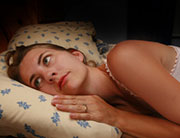- 8 Ways to Increase Dopamine Naturally
- 7 Best Breads for Maintaining Stable Blood Sugar
- Gelatin vs. Collagen: Which is Best for Skin, Nails, and Joints?
- The Long-Term Effects of Daily Turmeric Supplements on Liver Health
- Could Your Grocery Store Meat Be Causing Recurring UTIs?
- Are You Making This Expensive Thermostat Error This Winter?
- Recognizing the Signs of Hypothyroidism
- 10 Strategies to Overcome Insomnia
- Could Artificial Sweeteners Be Aging the Brain Faster?
- Techniques for Soothing Your Nervous System
Poor Sleep? Eating Less at Night May Make Next Day Easier


Concentration and attention problems caused by sleep deprivation might be eased by eating less late at night, according to a new study.
The research included 44 volunteers, aged 21 to 50. For three days, they were given unlimited access to food and drink during the day. But they were only allowed to sleep four hours a night.
“Adults consume approximately 500 additional calories during late-night hours when they are sleep-restricted,” senior author David Dinges, director of the unit for experimental psychiatry and chief of the division of sleep and chronobiology at the University of Pennsylvania in Philadelphia, said in a university news release.
On the fourth night, about half of the participants continued to have unlimited access to food and drink. The other half were restricted to water from 10 p.m. until they went to sleep at 4 a.m.
At 2 a.m. on each of the four nights, the participants underwent tests to measure their memory, thinking skills, sleepiness, stress level and mood.
On the fourth night of sleep restriction, those who fasted had better reaction times and fewer attention lapses than those who ate, the findings showed.
Also on the fourth night, those who ate had much slower reaction times and more attention lapses compared to the first three nights. The people who fasted didn’t show a decrease in performance, the investigators found.
The study was scheduled to be presented this week at the annual meeting of the Associated Professional Sleep Societies in Seattle. Findings presented at meetings are generally viewed as preliminary until they’ve been published in a peer-reviewed journal.
In another study to be presented at the meeting, the same team of researchers found that adults with chronic lack of sleep have a reduced metabolism. The researchers suggested that people may need to compensate for this loss of calorie-burning power by increasing their physical activity levels or reducing their calorie intake to prevent weight gain after sleep deprivation.
This study included 36 healthy adults aged 21 to 50. Their resting metabolic rates — how much energy their bodies use when relaxed — was measured after normal nights of sleep, and after five nights of sleeping just four hours a night.
Resting metabolism decreased after sleep deprivation, the study found. The good news is that it returned to normal after a night of recovery sleep, according to the study.
“Short sleep duration is a significant risk factor for weight gain and obesity, particularly in African Americans and men,” study senior author Namni Goel, a research associate professor of psychology in psychiatry at the University of Pennsylvania, said in the news release.
More information
The U.S. National Heart, Lung, and Blood Institute has more about sleep deprivation.
Source: HealthDay
Copyright © 2026 HealthDay. All rights reserved.










